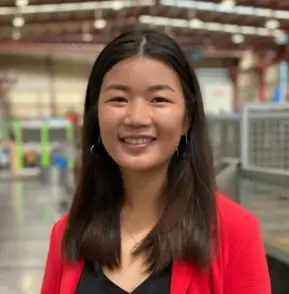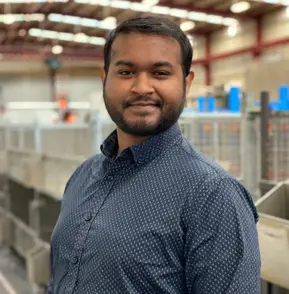How have you navigated the transition from university to the workforce?
Debbie: The biggest adjustment was certainly balancing professionalism with approachability. I have found informal mentorship in the other women within the business. While we all work in different teams, there is always the opportunity to debrief over a coffee. This level of support speaks to the inclusivity of Facteon. It’s an organisation with a culture that makes you want to wake up early and head into work to do something great.
Vincent: Successful project delivery is underpinned by your ability to keep the lines of communication open with the customer. You can never assume that the problem is mutually understood by all. These alternate perspectives are often invaluable as they highlight limitations in your approach that you would never have identified alone.
Imposter Syndrome. Have you experienced it and how do you overcome it?
Vincent: As they say, success is 10% talent and 90% hard work. There’s a first time for everything so forge ahead and stay positive.
Debbie: My remedy for Imposter Syndrome is looking at past achievements and experiences. You may be facing an entirely new problem but there’s no reason that you can’t achieve this time.
What motivated you to join Facteon?
Vincent: I developed an interest in automation and robotics early in my engineering study. I came across Facteon during an internship with one of Facteon’s customers. I saw the Facteon name on an impressive piece of equipment. I decided that I needed to join the team that designed, manufactured and commissioned this kit.
Debbie: I also have an interest in smart manufacturing and Industry 4.0. As an Engineering and Commerce student, I sought a role in a business focused on delivering dynamic manufacturing solutions that enabled manufacturers to meet their business goals. Throughout the interview process, I felt welcomed by the inclusive culture. Upon joining, I found an environment in which everyone is encouraged to get stuck in, ask for help and challenge ideas.
What has surprised you most about the manufacturing industry?
Vincent: At the first factory I visited, the range of opportunities for automation was mind-blowing. The potential for automation to improve operational performance through saving money, time and resources is incredible. That’s what makes starting out in this field so interesting. The best part is that it can only get better.
Debbie: The hesitation around change is something I didn’t expect to see in a technology-driven industry. The engineers here who have been around a little longer than me have noticed a shift in the mindsets of manufacturers, however. The majority are aware of the potential of these new technologies and, of course, the risks of continuing in their current state. This has spurred action by many who will ultimately reap the rewards.
What’s your advice to other engineers in the making?
Debbie: My advice is perhaps a little unorthodox. I’d say pursue hobbies outside of engineering. It’s easy to become all consumed by securing your first engineering role. Other activities allow you to develop complementary skills and help you to grow as a person, while providing a much-needed mental break.
Vincent: University teaches you how to learn. You take in information, reflect and complete work to better understand a concept. I’ve grown through finding personal projects that push me to learn new skills. It’s essential to continue exercising that ability to learn regardless of where you are at on your engineering journey.



